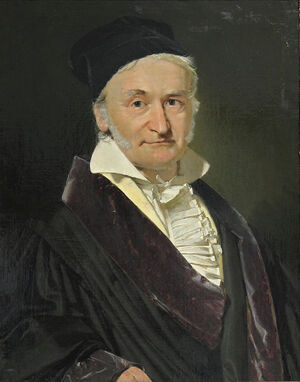Carl Friedrich Gauss (nonfiction): Difference between revisions
No edit summary |
No edit summary |
||
| Line 2: | Line 2: | ||
Sometimes referred to as the ''Princeps mathematicorum'' (Latin, "the foremost of mathematicians") and "greatest mathematician since antiquity", Gauss had an exceptional influence in many fields of mathematics and science and is ranked as one of history's most influential [[Mathematician (nonfiction)|mathematicians]]. | Sometimes referred to as the ''Princeps mathematicorum'' (Latin, "the foremost of mathematicians") and "greatest mathematician since antiquity", Gauss had an exceptional influence in many fields of mathematics and science and is ranked as one of history's most influential [[Mathematician (nonfiction)|mathematicians]]. | ||
On October 16, 1797, Gauss recorded in his diary that he had discovered a new proof of the Pythagorean Theorem. | |||
On September 2, 1808, Gauss wrote to mathematician Wolfgang Bolyai, saying: "It is not knowledge, but the act of learning, not possession but the act of getting there, which grants the greatest enjoyment." | On September 2, 1808, Gauss wrote to mathematician Wolfgang Bolyai, saying: "It is not knowledge, but the act of learning, not possession but the act of getting there, which grants the greatest enjoyment." | ||
Revision as of 12:15, 13 September 2018
Johann Carl Friedrich Gauss (/ɡaʊs/; German: Gauß, pronounced [ɡaʊs] Latin: Carolus Fridericus Gauss) (30 April 1777 Braunschweig – 23 February 1855 Göttingen) was a German mathematician who contributed significantly to many fields, including number theory, algebra, statistics, analysis, differential geometry, geodesy, geophysics, mechanics, electrostatics, astronomy, matrix theory, and optics.
Sometimes referred to as the Princeps mathematicorum (Latin, "the foremost of mathematicians") and "greatest mathematician since antiquity", Gauss had an exceptional influence in many fields of mathematics and science and is ranked as one of history's most influential mathematicians.
On October 16, 1797, Gauss recorded in his diary that he had discovered a new proof of the Pythagorean Theorem.
On September 2, 1808, Gauss wrote to mathematician Wolfgang Bolyai, saying: "It is not knowledge, but the act of learning, not possession but the act of getting there, which grants the greatest enjoyment."
On April 28, 1817 Gauss wrote to astronomer H. W. M. Oblers, saying, "I am becoming more and more convinced that the necessity of our (Euclidean) geometry cannot be proved, at least not by human intellect nor for the human intellect."
In the News
Fiction cross-reference
Nonfiction cross-reference
- Mathematician (nonfiction)
- Sophie Germain (nonfiction)
- Theorema Egregium (nonfiction)
- Heinrich Wilhelm Matthias Olbers
External links:
- Carl Friedrich Gauss @ Wikipedia
